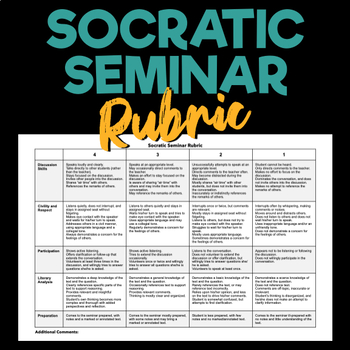- Zip
Description
This resource includes a rubric, guidelines, discussion prompts, and student reflection for a Socratic Seminar based on ANY text.
A Socratic seminar is a student-led, formal discussion, based on a text. The conversation focuses on rigorous and thoughtful dialogue amongst classmates.
Students must prepare by reading and annotating the text. Then during the seminar, they will listen closely to the comments of others while thinking critically for themselves. They must talk to EACH OTHER, not the teacher.
Through this seminar, students improve their critical thinking, social-emotional, and speaking and listening skills. They also learn to work cooperatively and respectfully!
All of the products in this resource are available as "ready to print" (PDFs) and "editable" (word documents).



